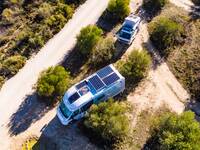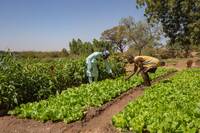Replace conventional cleaning products with biodegradable alternatives free of harmful chemicals. Look for eco-friendly dish soap, all-purpose cleaners, and laundry detergents. These products break down naturally, reducing their impact on the environment. Be sure to follow any rules and recommendations at any campsite you are booked into.
Sustainable travel has become increasingly important in today's world as we strive to preserve our planet's natural beauty and resources for future generations. Embracing eco-friendly practices during our holidays is a small but significant way to make a positive impact. Our bespoke motorhome holidays offer a unique opportunity for travellers to adopt sustainable habits while exploring beautiful destinations in Australia, New Zealand, Southern Africa, Canada, and the United States.
Our motorhomes are equipped with many great features, including air conditioning, heating, and a fully functional kitchen which provides a comfortable and self-contained living space. Large fuel capacity tanks and onboard water systems can help you minimise the need for external sources, creating more sustainable travel.
In addition to our motorhome's design and features, there are numerous ways to make your holiday more eco-friendly. From supporting local communities and businesses to respecting nature and wildlife, sustainable travel practices can enhance your motorhome experience while preserving the environment for future generations.
Let's look at some ways in which you can further reduce any impact on your motorhome holiday:
Our motorhomes are equipped with many great features, including air conditioning, heating, and a fully functional kitchen which provides a comfortable and self-contained living space. Large fuel capacity tanks and onboard water systems can help you minimise the need for external sources, creating more sustainable travel.
In addition to our motorhome's design and features, there are numerous ways to make your holiday more eco-friendly. From supporting local communities and businesses to respecting nature and wildlife, sustainable travel practices can enhance your motorhome experience while preserving the environment for future generations.
Let's look at some ways in which you can further reduce any impact on your motorhome holiday:
Our motorhomes are equipped with many great features, including air conditioning, heating, and a fully functional kitchen which provides a comfortable and self-contained living space. Large fuel capacity tanks and onboard water systems can help you minimise the need for external sources, creating more sustainable travel.
In addition to our motorhome's design and features, there are numerous ways to make your holiday more eco-friendly. From supporting local communities and businesses to respecting nature and wildlife, sustainable travel practices can enhance your motorhome experience while preserving the environment for future generations.
Let's look at some ways in which you can further reduce any impact on your motorhome holiday:

Reducing Your Carbon Footprint
Motorhome holidays provide an incredible opportunity to explore diverse landscapes and enjoy unforgettable experiences. However, it's essential to be mindful of our environmental impact. Motorhomes are usually quite large vehicles and, as such, are not the most fuel-efficient. Implementing a few practical tips can reduce your carbon footprint and make your motorhome holiday more eco-friendly.
Fuel-efficiency and alternative fuel options
Selecting a fuel-efficient motorhome can significantly reduce the emissions produced during your travels. We have various models of motorhomes depending on your country of choice. In recent years, motorhome manufacturers have been developing models with alternative fuel options, such as electric or hybrid engines. Although these options might only be available in some places, it's worth considering them whenever possible.
Drive steady and avoid rapid acceleration/braking
Adopting eco-friendly driving habits can help reduce fuel consumption and lower emissions. Maintain a consistent speed, avoid aggressive acceleration, and brake gently. Using cruise control on long stretches of open road can help you maintain a steady speed and improve fuel efficiency.
Planning ahead and efficient routes
Proper planning can make a significant difference in reducing your motorhome's fuel consumption. Aim to take the most direct route from one destination to another, avoiding unnecessary detours and backtracking. By minimising the total driving distance, you'll consume less fuel and produce fewer emissions. Our expert team will help you design your holiday with this in mind.
Use eco-friendly products
Incorporating environmentally friendly products into your motorhome holiday can further reduce your impact on the environment. Here are some examples of eco-friendly products to consider:
By making small, conscious choices, these tips and eco-friendly products can significantly reduce your carbon footprint and contribute to a more sustainable future. As you plan your journey, consult your motorhome holiday team for additional guidance and recommendations on minimising your environmental impact.
For other ideas on products to buy, consult our blog Staying Sustainable on Holiday.

Supporting Local Communities and Economies
One of the key aspects of sustainable travel is fostering a positive impact on the communities and economies of the destinations you visit. By choosing to support local businesses and experiences, you can help create a more sustainable holiday and contribute to the well-being of the people who call these places home. Here are some further tips:
Shop local and independent
Consider visiting local markets and independent stores instead of large chain supermarkets or tourist shops when shopping for food and souvenirs. By doing so, you're directly supporting small businesses and the local economy. By purchasing unique, handcrafted souvenirs, you're supporting local artisans and promoting cultural preservation. Additionally, local markets often sell fresh, locally sourced produce, which has a smaller carbon footprint than imported goods.
Choose local experiences
Mass tourism can strain local resources and contribute to environmental degradation. Instead, seek out authentic, locally operated experiences that showcase the culture and heritage of the places you visit. For instance, consider taking a guided tour with a local expert or participating in a cooking class to learn about regional cuisine. These experiences provide a more intimate and genuine connection to the destination and contribute directly to the local community.
Local artisans and traditional crafts
Connecting with local artisans and learning about traditional crafts can help preserve cultural heritage and support sustainable livelihoods. Visit local workshops, studios, or galleries where you can observe artisans at work, learn about their techniques, and purchase handcrafted items. By engaging with these artisans and showing an interest in their crafts, you're contributing to the continuation of these skills and promoting the value of their work within their communities.
By focusing on supporting local communities and economies during your motorhome holiday, you're helping to create a more sustainable and responsible tourism industry. These actions reduce your environmental impact and foster a deeper connection to the places you visit, enriching your travel experience and creating lasting memories.
Protect children
Giving money or gifts to begging children can be harmful. It can provide children with an incentive to stay out of school, and is sometimes part of organised crime. They may also be trafficked and forced to beg.
Donating money to a respectable local Non-Governmental Organisation is the most beneficial way to give back to children in need.

Respecting Wildlife and Nature
Preserving the beauty and integrity of natural environments is a crucial aspect of sustainable travel. As you explore the stunning landscapes and encounter fascinating wildlife during your motorhome holiday, it's essential to be mindful of your impact on these delicate ecosystems. Here are some tips for respecting nature and wildlife while ensuring your holiday remains sustainable and eco-friendly:
Observe from afar
When encountering wildlife, maintain a safe distance to avoid causing stress or harm to the animals. Never feed wildlife, as this can disrupt their natural feeding habits and make them reliant on human interaction. Additionally, avoid making loud noises or sudden movements that could disturb animals in their natural habitats.
Stick to established trails
Many natural environments are fragile, and wandering off established trails can damage vegetation or disrupt wildlife habitats. Always stay on designated paths and follow any posted signs or markers to minimise your impact on the environment. By doing so, you help preserve these areas for future generations to enjoy
Leave No Trace
Leave No Trace principles provide guidance on how to minimise your impact on the environment while camping and exploring natural areas. Key principles include:
Dispose of waste properly Carry out all rubbish and leftover food disposed of in appropriate places. Use designated bathroom facilities or pack out human waste where required.
Leave what you find Do not remove rocks, plants, or other natural features. Avoid disturbing historical, cultural, or archaeological sites.
Respect wildlife Observe wildlife from a safe distance and avoid feeding or disturbing them.
Be considerate of other visitors Keep noise levels down, respect other travellers' experiences, and follow posted rules and regulations.
Participate in responsible experiences
When considering wildlife excursions, choose operators that prioritise the well-being of the animals and their environment. Responsible tour companies adhere to strict guidelines that minimise disturbance to wildlife and promote conservation efforts. By supporting these eco-friendly experiences, you contribute to the preservation of these incredible creatures and their habitats.

Be vocal
It's important to raise awareness of how to be more sustainable when travelling, so telling people, either in person or on social media, about your efforts goes a lot further than you think!
By asking for greener and fairer options, and giving feedback on the impacts, the demand for better practices and responsible tourism grows. Ask where your food is sourced from, does it come from local farmers? Is it from a sustainable source? What is being done to reduce plastic waste? This will motivate providers to offer more sustainable options which leads to a more positive future.
In conclusion, a sustainable motorhome holiday can enrich your travel experience by deepening your connection with the destinations you visit. To recap, here are our top tips:
- Opt for fuel-efficient motorhomes and adopt eco-friendly driving habits.
- Use environmentally friendly products throughout your journey.
- Support local communities and economies by shopping at local markets, choosing authentic experiences, and engaging with artisans.
- Respect nature and wildlife by maintaining a safe distance from animals, sticking to established trails, practising Leave No Trace principles, and participating in responsible wildlife experiences.
When planning your motorhome holiday, contact our team for guidance on sustainable travel options and experiences tailored to your interests. Our knowledgeable team can help you plan your itinerary while minimising your environmental impact and maximising your enjoyment of these incredible destinations.
Peter Stannett
Content Writer
Peter is our content writer and SEO specialist, helping keep our content current and monitoring website traffic.
His content covers all four corners of the globe, across topics like activities, advice, food, culture and history.
More by Peter StannettRecent Blog Posts
-
Explore the World Your Way
February 13, 2025 -
Guest Post: A Journey through the Parks and Lakes of Western Canada
October 28, 2024 -
Rhythms of the South: Celebrating the Sounds of Southern Soul, Gospel and Funk
October 10, 2024 -
Rhythms of the South: Exploring the Soul of Memphis Blues, Soul and Rock 'n' Roll
October 2, 2024 -
Rhythms of the South: A Journey Through the Jazz and Dixieland Roots of New Orleans
September 24, 2024

